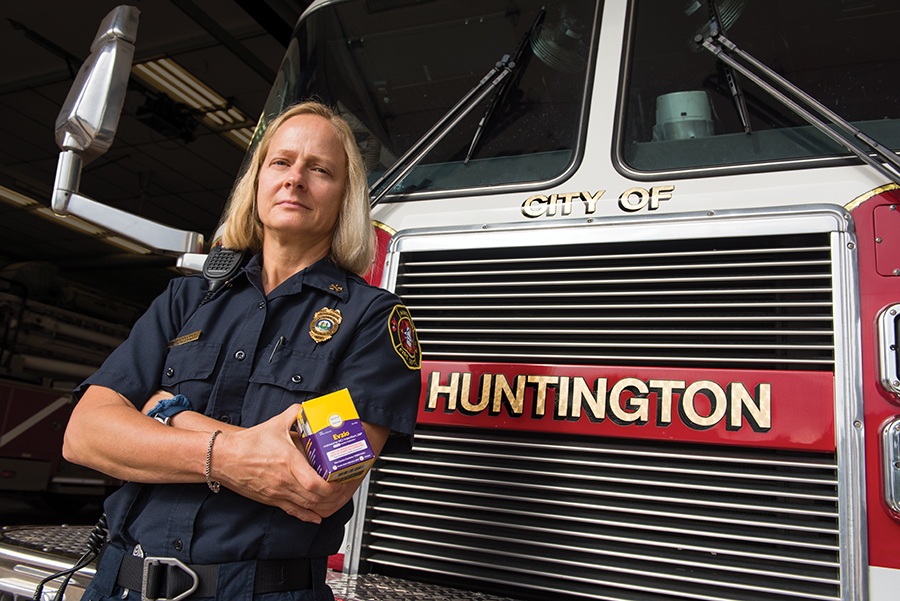In the second installment of our “In the Spotlight” series, we highlight groups offering a second chance to those who need it most.
By Katherine Pyles
HQ 95 | AUTUMN 2016
When the crew from HBO’s Vice came to Huntington last year, they told Jan Rader, RN, deputy chief of the Huntington Fire Department, that they wanted to film an overdose. It didn’t take long for a call to come in. In 2015 alone, there were 944 overdoses in Cabell County, 70 of them fatal.
With TV cameras in tow, Rader and other first responders grabbed their gear and left. The address was familiar – they’d responded to overdoses there before. It was Mickey Watson’s house.
Paramedics successfully revived Watson and transported him to the hospital. The film crew came along, hoping Watson would sign a release allowing them to use the footage. Before Watson signed, he asked if he could see what they filmed. They said yes.
Within eight days of watching the footage, Rader says, Watson was enrolled at Recovery Point of Huntington. He and his fiancée Sarah have been clean ever since.
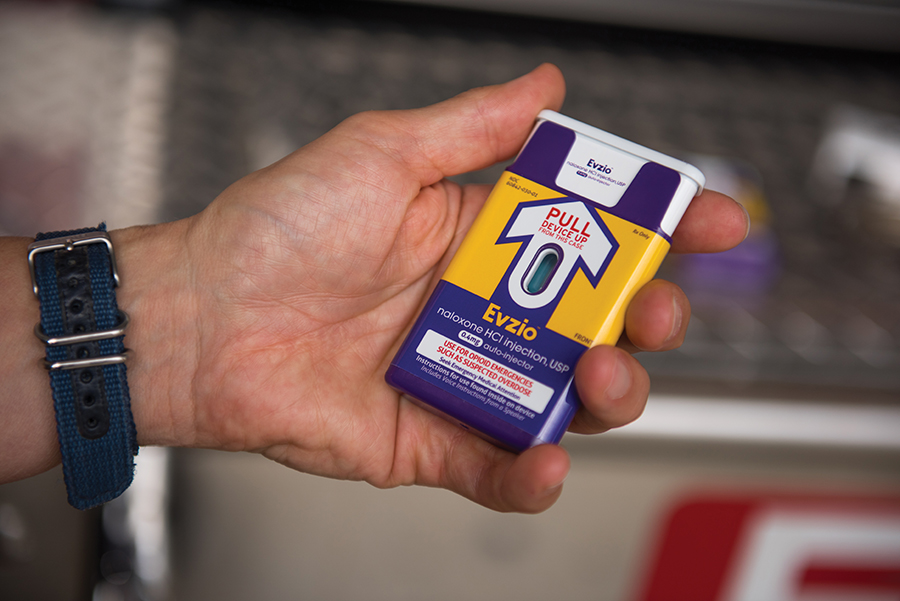
Rader says Watson’s story is proof of two things: First, lives can change. Second, everyone deserves a second chance.
“When we show up to an overdose, we don’t know what kind of life that person has lived,” she says. “If you knew their backstories, you’d think, ‘Wow, how are they still alive?’ Some started with a legal prescription. Others have a horrendous background. They’ve lived incredibly hard lives, and they’re not given second chances enough.”
In Huntington, though, that’s changing.
When Prison Isn’t the Answer
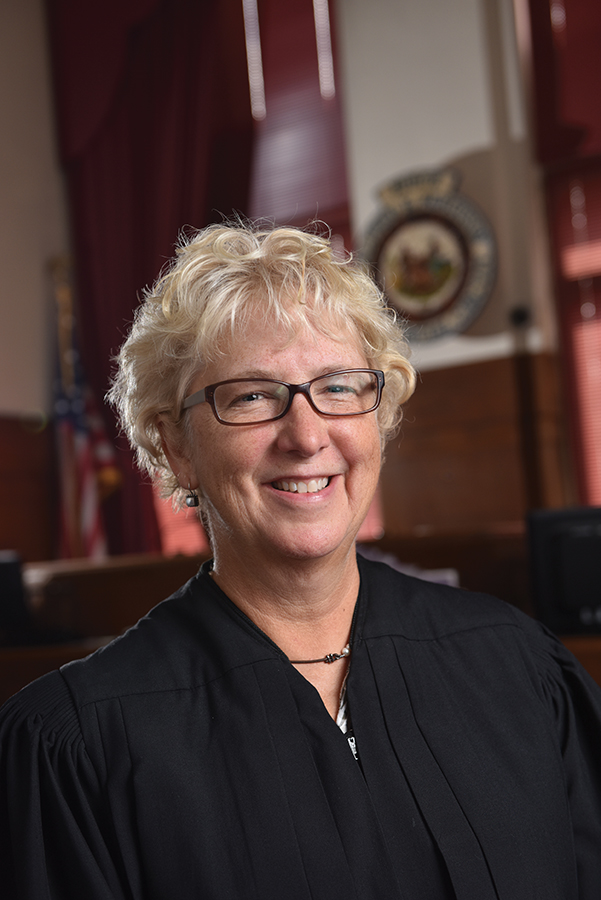
At the Cabell-Huntington Adult Drug Court, second chances are earned through a little tough love and a lot of hard work. Established and led by Judge Patricia Keller since 2008, drug court offers an alternative to prison time for nonviolent offenders. It separates those who commit crimes and happen to be on drugs from those who commit crimes because of their addiction.
“We take the most serious drug addicts that we can safely monitor,” Keller says. “Drug court is not easy. It involves strict supervision, weekly court sessions and intense therapy. It’s a lot more than peeing in a cup.”
Clients participate in counseling, treatment, frequent drug screenings, group meetings and community service. They regularly attend drug court sessions, where Keller – with the compassion of a parent, the enthusiasm of a teacher and the soberness of, well, a judge – doles out sanctions and incentives based on participants’ recent conduct. They are required to obtain employment or attend school, pay restitution to victims and earn a high school diploma or GED. Through the yearlong, sometimes even longer, program, they earn a second chance at a full life.
“We want our folks to become engaged parents and family members, have safe housing and be healthy,” Keller says. “We want them to find employment and become valuable members of our community.”
In 2015, the grant-funded WEAR Program was created as a specialized track within the Cabell-Huntington Adult Drug Court. Designed to address the unique needs of drug-addicted women in the sex trade, the program is the only one of its kind in a city the size of Huntington. Women in the WEAR Program develop important life skills and are treated for the physical, emotional and psychological trauma they’ve endured.
“These women not only have the drug issues of our traditional drug court but also many underlying issues that got them involved in the sex trade – child abuse, sexual abuse, domestic violence,” Keller says. “They need more from us. They need tools and resources that will address their physical and mental health needs and help them deal with the stressors in their lives.”
A team approach is crucial, Keller says, and both the Adult Drug Court and WEAR Program boast a full roster of community members who serve on treatment teams. Team members include probation officers, case managers, day report center representatives, home confinement representatives, therapists, prosecutors and public defenders. Community agencies and nonprofit organizations partner with the court to provide everything from housing and medical care to basic hygiene items and clothing.
On the Front Lines
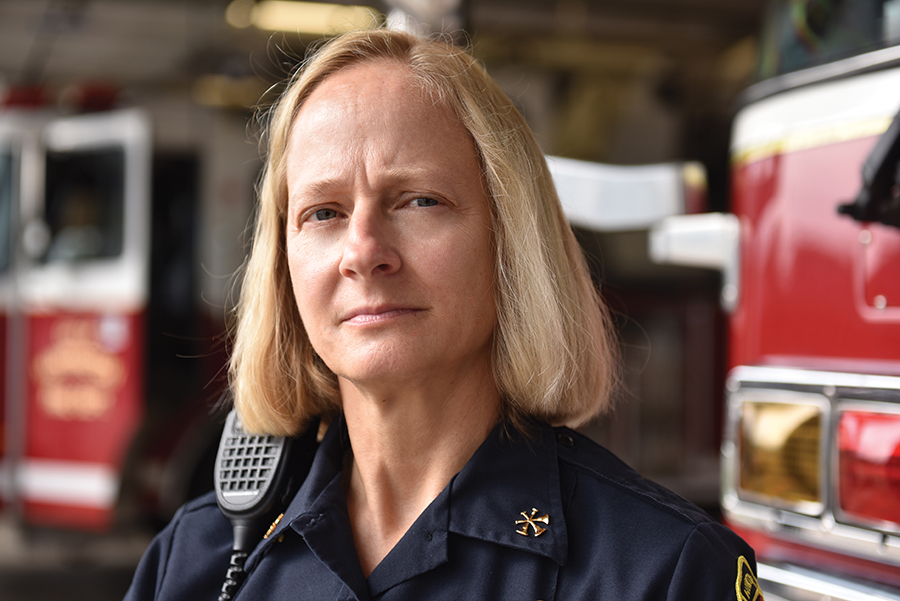
When it comes to second chances, no group has greater firsthand knowledge than Cabell County’s first responders. It takes its toll, Rader says.
“In 2015, I saw well over 40 deaths,” she says. “And that’s okay for an old lady at the end of her career, but that’s not okay for a 21-year-old paramedic, a 21-year-old cop, a 21-year-old firefighter. Our first responders are overwhelmed and frustrated. They’re seeing the same people over and over again, and sometimes they’re seeing them until they die. But they do an exceptional job under high stress, and I’m extremely proud of them.”
She says the disease of addiction requires a special mindset: “If we save somebody 10 times, that’s 10 extra chances they’ll have to turn their life around,” she says. “They need us, even if they’re not ready to take that step right now.”
That attitude of kindness and compassion starts at the top, with the leadership of Mayor Steve Williams and Police Chief Joe Ciccarelli, says Dr. Michael Kilkenny, director of the Cabell-Huntington Health Department.
“Huntington is a city of partnership, forward thinking and strong leadership,” Kilkenny says. “While other police departments struggle to understand the drug problem, our police are attacking the problem head on, with an innovative approach that is hard on the dealers but has compassion for the users. While other mayors are so deathly afraid of negative publicity that they’d rather let their people die than acknowledge the problem, Mayor Williams is saying, ‘We will define our problems, not be defined by them. And by defining them, we will solve them.’”
Knowledge Is Power
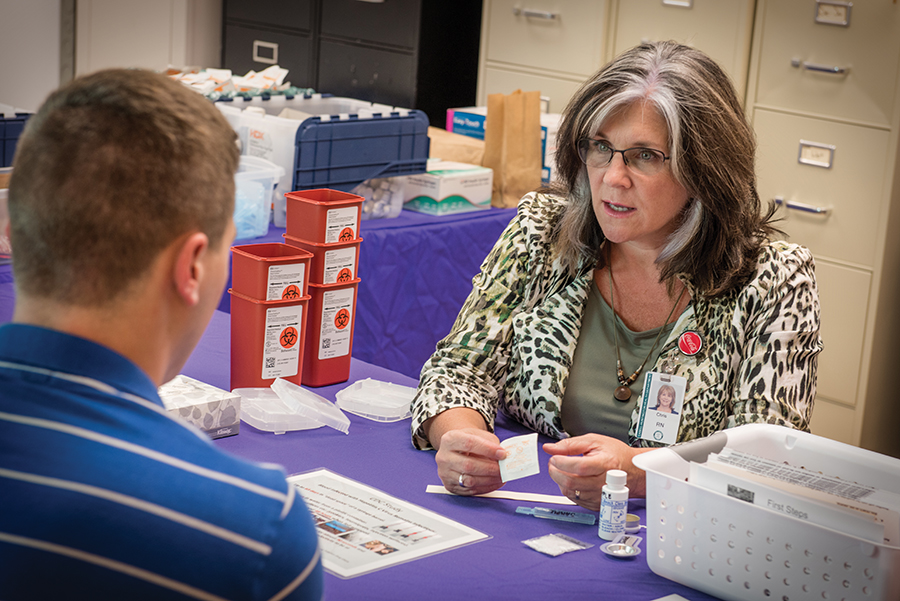
At Marshall University, students are taught from day one the importance of remaining socially aware and involved in the issues that face their community.
“It’s difficult to say where Marshall University ends and the Huntington community begins,” says Marshall University President Jerome Gilbert. “All of us – our faculty, our students, the entire Marshall family – have a responsibility to assist our community in any way we can. The university can’t solve all of the social and economic and public health issues that face our region – but we can be helpful.”
Amy Saunders, director of student health education programs, works closely with groups on campus and in the community to coordinate initiatives like AlcoholEdu, SBIRT (Screening, Brief Intervention, and Referral to Treatment) training and the School of Pharmacy’s Generation Rx program to help students identify and prevent substance abuse. University police officers carry Naloxone kits in case they encounter a drug overdose. Naloxone, a fast-acting drug that stops an overdose while it’s in progress, buys precious time until the overdosing individual can be transported to an ER.
“On Marshall’s campus and campuses nationwide, alcohol is still the No. 1 most abused substance – but we want to be prepared,” Saunders says. “To do that, we have to take a public health approach, where we screen everyone, prepare everyone and train as many people as we can. We’re looking at the system changes, cultural changes and environmental changes that we can be making right now.”
In the university’s ever-broadening effort to build both large-scale partnerships and one-on-one relationships, faculty in the English Department recently worked with individuals affected by addiction to help them tell their stories. The individuals read and shared their stories Sept. 7 at the Joan C. Edwards Playhouse, Saunders says.
The Medical Community’s Response
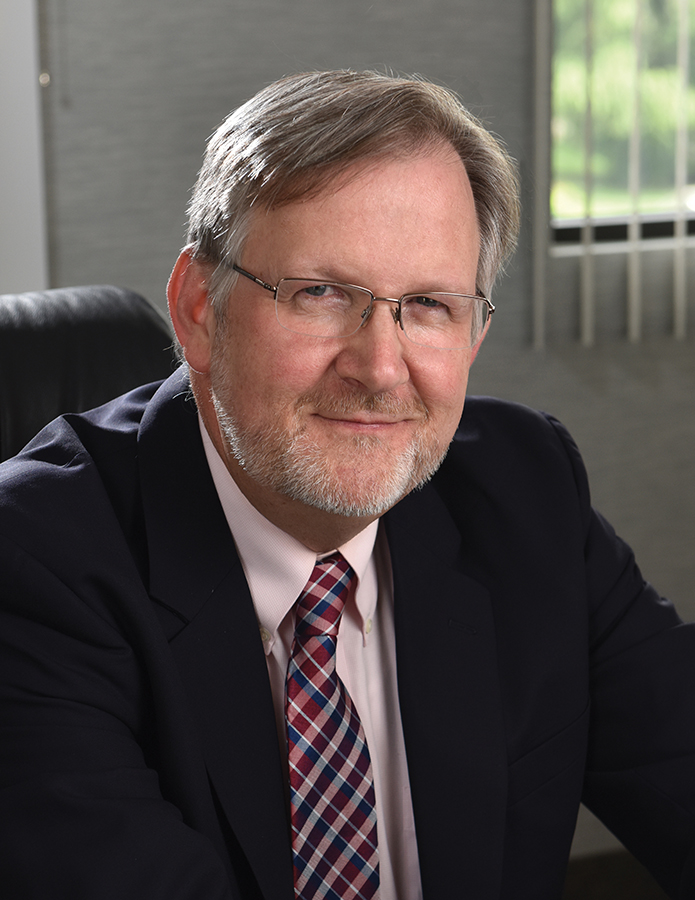
At the Marshall University Joan C. Edwards School of Medicine, the next generation of physicians is armed and ready for the challenges it will face. From training in SBIRT techniques to researching factors that could determine an individual’s success with a particular addiction recovery model, Marshall’s medical students gain not only an understanding of the science of addiction but also an awareness of their own role in addressing addiction-related issues.
“The drug epidemic is one of the most important health challenges we’ve ever faced,” says Dr. Jim Becker, vice dean for governmental affairs and health care policy. “The overdoses are what make the headlines, but there are multiple medical complications tied to substance use disorders, like Neonatal Abstinence Syndrome, hepatitis B and C, HIV and other infections caused by IV drug use. Medical students are seeing things on a regular basis that they’d rarely have encountered just 10 years ago. Every one of our graduates will deal with this problem in some form.”
Medical students and residents receive addiction-specific training in fields such as pharmacology, obstetrics, psychology and neonatal care. They provide assistance in the ER when patients are brought in for a drug overdose and learn to recognize the signs of a substance use disorder. The School of Medicine provides health care to participants in the Cabell-Huntington Adult Drug Court as well as assistance to recovery programs throughout the Tri-State.
“The School of Medicine has a history of responding to the major problems in our community – diabetes, childhood obesity, now this,” says Dr. Bob Miller, vice dean for medical student education. “We have an obligation to research these topics, to take on these challenges and to help find solutions.”
A Pharmacist’s Unique Role
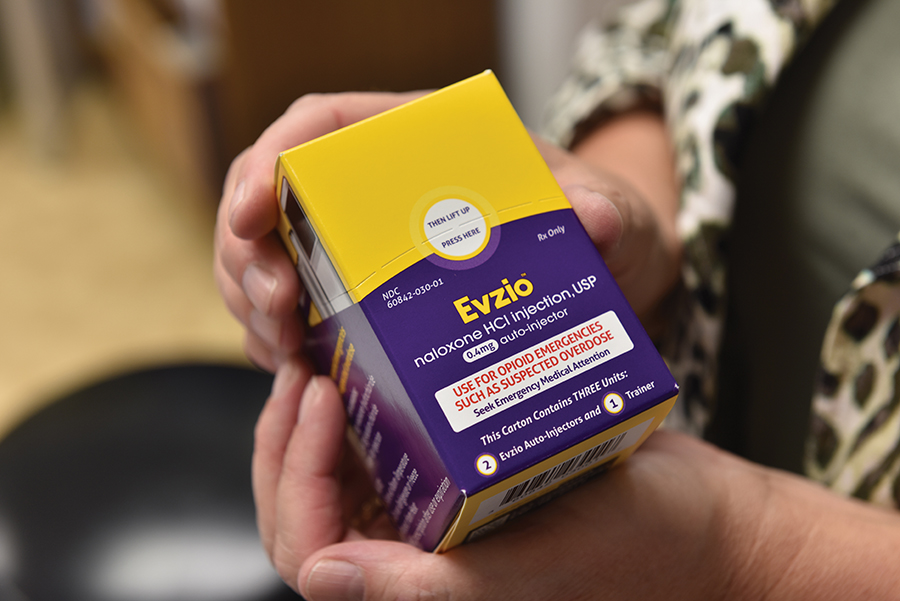
Students in the Marshall University School of Pharmacy offer free Naloxone training classes and kits three times a week at the Cabell-Huntington Health Department as part of the city’s harm reduction program. They also visit area schools to educate youth on the dangers of substance abuse. Despite just graduating its first class of pharmacists in May 2016, community involvement has been a priority for the pharmacy school since its beginning.
“Being a pharmacist is about more than dispensing medications,” says Dr. Kevin Yingling, dean of the School of Pharmacy. “It’s about service – to patients, to other health care providers and to the community. It’s about being a resource for those in need and using our expertise to address the issues that face our region. If we turn a blind eye to our community, we do a disservice not only to the community but also to ourselves, and to the unique role we have as medical providers.”
The health department’s harm reduction program also includes a syringe exchange, led by Dr. Kilkenny, to reduce the risks associated with shared or improperly discarded needles and create a bridge of trust between drug users and the medical community. The exchange includes representatives from Lily’s Place, Prestera, Recovery Point and other agencies to help guide individuals – when they’re ready – to the resources they need. A uniformed police officer protects participants and staff during the exchange – an unprecedented partnership between public health and law enforcement.
“It’s a matter of building trust,” Dr. Kilkenny says. “We have an entire population of people who are marginalized, whose contributions to society are being diminished. And when we marginalize or diminish a person, we diminish our whole society. We’ve got to reacclimate these folks. We’ve got to get them back. And to do that, we’ve got to have their trust.”
Locally owned Fruth Pharmacy donated the first 13,500 syringes to start the program and has since donated over 100,000 syringes to health departments across the Tri-State. Its efforts have had a national impact: Tim Weber, Fruth’s vice president of pharmacy, was recently named the 2016 Next-Generation Pharmacist in the Civic Leader category by Pharmacy Times® and Parata Systems.
“I’ve had family members impacted by drug addiction, and I know the pain of seeing loved ones struggle,” says Fruth Pharmacy President Lynne Fruth. “Far too many of us know that pain. That person struggling with addiction, who can’t imagine a better life, who’s lost all hope, has a loved one somewhere who cares about him or her. Through these harm reduction programs, people are being shown kindness, compassion and most of all hope. They’re beginning to realize, ‘Maybe there is hope, even for me.’”
We’re all doing our part – but perhaps the sobering reason for that is because we’re all affected in some way, says Kenny Burner, deputy director of Appalachia HIDTA (a federal program that stands for High Intensity Drug Trafficking Areas).
“These are our mothers, fathers, daughters, sons, sisters, brothers, uncles and aunts,” Burner says. “These are our people. And hopefully, they will take the second or third or fourth or fifth chance that we give them – but even if they don’t, we have a moral obligation to do the right thing for them.”
There’s no easy answer, says Mayor Williams, but one thing’s for certain: Huntington is a city that believes in second chances.
“What we have in Huntington is an unrelenting determination that we will not give up on each other,” he says. “We will not let go.”

